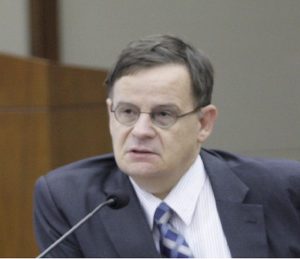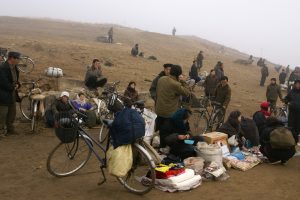Memo #201
By Andrei Lankov – andreilankov [at] gmail.com
 North Korea is often described as the “world’s last Stalinist state,” but this is misleading. While the facade of a Stalinist economy remains visible in Pyongyang, the nation’s capital, the socialist regime has long become an empty shell. The North Korean economy is now dominated by legal, semi-legal, and entirely illegal private enterprises that provide employment for workers who have failed to make ends meet in the formal economy. As such, it more closely resembles a post-socialist Eastern European economy than a Stalinist one.
North Korea is often described as the “world’s last Stalinist state,” but this is misleading. While the facade of a Stalinist economy remains visible in Pyongyang, the nation’s capital, the socialist regime has long become an empty shell. The North Korean economy is now dominated by legal, semi-legal, and entirely illegal private enterprises that provide employment for workers who have failed to make ends meet in the formal economy. As such, it more closely resembles a post-socialist Eastern European economy than a Stalinist one.
Since the 1990s, the output of most state factories has dramatically shrunk, and many state-owned plants have stopped operating altogether. However, workers are still required to attend their workplaces. They have little to do most of the time, and salaries can only buy approximately one kilo of rice per month. It is not surprising that many of these workers have found ways to survive outside of the state economy.
Some have opened businesses, often with the help of good Chinese connections, and financial support from relatives in China. Workers who lack such connections and start up capital have sought alternative survival strategies, such as working on illegal plots of land, usually in the mountains. Others find jobs in the many private workshops that have emerged in the last ten years in North Korean cities. The more adventurous are engaged in smuggling and narcotics production. Indeed, the latter has become a major social problem over the last five to seven years. Finally, some people augment their official incomes by stealing supplies and products from their workplaces. They also use their factories’ machinery for private production.
These phenomena demonstrate that North Korea has become a post-socialist country, and is experiencing difficulties similar to those of Eastern Europe, albeit more pronounced. In Eastern Europe, experts blame neoliberal reforms for such problems as collapse of welfare systems, massive unemployment and corruption, but North Korea’s experience shows that similar things can happen under the watch of a very illiberal government as well.
About the Author:
Andrei Lankov is a professor in Korean Studies at Kookmin University, Seoul, South Korea

Private business, such as the trade in this roadside market in Chongdan County in southwestern North Korea, in is an essential aspect of livelihood for most people in the country today. Photo by Moravius.
Links:
- Adjustment Strategies of Industrial Workers in a Post-Crisis North Korean City, Pacific Affairs, Forthcoming (By Andrei Lankov, In-ok Kwak, Seok-hyang Kim and Choong-bin Ch
- Pyongyang Strikes Back: North Korean Policies of 2002-08 and Attempts to Reverse “De-Stalinization from Below”, Asia Policy, 2009 (by Andrei Lankov)
- Blog on North Korean issues – in Russian, with occasional English posts – (By Andrei Lankov)
- North Korea is a Nuclear Power, Foreign Policy, 2013 (By Andrei Lankov)
Related Memos:
- See our other memos on North Korea
Comments are closed, but trackbacks and pingbacks are open.